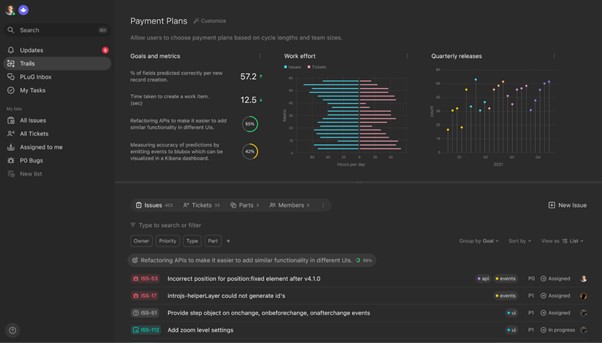Developer “How-to”s: Great Developers Never Stop Learning
Great developers never stop learning. They are always looking for ways to improve their skills and always searching for new information. If you want to be a great developer, you need to do the same thing. One of the best ways to learn is to read developer “how-to”s. This article gives you step-by-step instructions on how to complete various tasks.
There are various steps to becoming a great developer like finding a great mentor, coding every day, learning new languages, regular practice, and many more. Some tips for becoming a great developer are as follows:
Find a great mentor
A mentor who is not in the same firm or place as you may be the most beneficial for you. You may chat with them and obtain their counsel over the phone, over email, or via the internet.
A mentor does not need to be employed by your organization or be an excellent developer. Find someone who knows software development and has succeeded in their field, whom you like and whose work you admire.
Learn how to communicate effectively
Those who hear you speak will be interested in what you have to say if you can communicate your thoughts clearly and simply.
Communication, on the other hand, is more than simply chatting. It is also essential to pay attention to what others have to say. According to research, excellent listeners are more successful in their jobs than people who are good talkers.
To be a good listener, you must first understand the importance of listening. This is particularly true when dealing with customers or other developers on your team. Learning to listen to others may be beneficial, particularly if you want to collaborate.
Some new startups like DevRev provide immense advantages to developers when it comes to communicating work progress to the rest of the team and organization. With DevRev, a CRM for product-led companies, developers can connect their code repository to DevRev. Moreover, all code changes are picked up and immediately connected to work items like tasks and issues.
Start coding every day
Writing code daily keeps your skills fresh, enables you to learn new languages and technologies, and allows you to work on projects that you are passionate about. Try a different hobby, or switch up your work at least once a month to keep things fresh and interesting.
Hone your skill by putting in regular hours of practice
You must actively work toward being better at what you do, rather than just trudging along and making tiny adjustments here and there as you go.
A development manager has a clear set of goals and objectives that are straightforward to monitor. This allows you to track your development and instantly see what skills/tools/technologies are lacking from your toolkit. Once they become significant in a real-world project, they will not be as unfamiliar as the rest of the environment when it comes later in life.
Put an end to your attempts to show yourself correctly
Novice software engineers (as well as some experts) look at their code and marvel at its beauty. Instead of attempting to make their code fail, they write tests to demonstrate that it does work. On the other hand, truly excellent programmers constantly seek out areas in which they are incorrect—knowing that consumers would ultimately discover the flaws in their code that they overlooked.
New languages that you need to know about
We are presenting a set of trendy languages, tools, and tips for developers to keep an eye on. As a developer, it’s important to never stop learning. There are always new languages, tools, and tips to stay ahead of the curve. Let’s explore these three languages.
a. ReactJS
ReactJS is a JavaScript library for building user interfaces. It was created by Facebook and is used by companies like Netflix, Airbnb, and Imgur. ReactJS makes it easy to create reusable components that can be used in different parts of an application. This makes development faster and more scalable.
How to learn ReactJS?
If you’re not familiar with ReactJS, check out this tutorial from TutsPlus. It will teach you the basics of ReactJS, and how to create simple components. Once you’ve got the basics down, you can build more complex applications.
How to use ReactJS with Webpack?
Webpack is a module bundler that helps optimize your code for performance. Facebook also uses it to build its web applications. This guide from Smashing Magazine will show you how to use ReactJS with Webpack and optimize your code for better performance.
How to use ReactJS with Babel?
Babel is a JavaScript compiler that lets you use next-generation JavaScript, even if your browser doesn’t yet support it. This guide from GeeksforGeeks will show you how to use ReactJS with Babel so that you can write code that uses the latest JavaScript features.
How to deploy a ReactJS application?
Once you’ve built your ReactJS application, you’ll need to deploy it somewhere. This guide from DigitalOcean will show you how to do that, and how to set up a production environment that’s optimized for performance.
How to debug a ReactJS application?
Debugging is an essential part of any developer’s toolkit. This guide from Mozilla will teach you how to debug a ReactJS application so that you can find and fix errors quickly.
b. Golang
If you’re a developer, you know that the field is always changing – new languages, frameworks, and platforms. It can be tough to keep up, but great developers never stop learning: they’re always looking for new ways to improve their skills.
One language getting a lot of attention lately is Golang (Officially GO).
- Golang was created by Google and is a statically typed, compiled language designed for efficiency and readability.
- Ken Thompson, Rob Pike, and Robert Griesemer designed this language as they were not satisfied with the C++ language and wanted something simpler.
- It was announced in 2009 and made open source in 2010 with its version 1.0.
- Since then, it has become famous for its simplicity and support for concurrent programming.
Why should you learn to GO?
- Easy Learning Curve
GO is one of the most straightforward programming languages available. It is a simple programming language to learn, particularly if you already have experience with another programming language.
Many GO developers who are confident in their ability to educate claim that they can teach an absolute novice how to construct an app using GO in a matter of hours.
- Active Community and Good Documentation
The GO programming language has an active community that always innovates and improves the language. The community also provides great documentation to help developers get started with GO. The documentation is extensive and covers everything from installation to advanced topics.
In addition, there are many resources available online that can help developers learn more about GO. There are numerous books, tutorials, and blog posts covering various aspects of GO. These resources can be extremely helpful for developers who are just getting started with the language. This makes it a great choice for developers who want to stay up-to-date with the latest trends in programming.
- Attractive Wages
The number of GO developers is likely to rise in the future since GO continues to increase in popularity year after year, and it is in high demand among consumers. Consequently, if you want to make more money, you should consider learning the GO programming language.
c. TypeScript
- TypeScript is an open-source project created by Microsoft and is available for use on all major platforms.
- TypeScript is a programming language that allows developers to create JavaScript programs with typed variables.
- This means that you can specify the type of data that a variable can hold, and the TypeScript compiler will check to make sure that you are using the variable correctly. This can help prevent errors in your code and make it easier for others to understand your code.
- In addition to being a typed language, TypeScript also supports features like classes and modules. This makes it easy to structure your code to be easy to understand and maintain.
- Many popular IDEs and text editors support TypeScript development, including Visual Studio Code, Atom, and Sublime Text.
Features of TypeScript
TypeScript is a typed superset of JavaScript that compiles to plain JavaScript.
- TypeScript supports all JavaScript features, including classes, modules, and interfaces.
- TypeScript provides you with the new ECMAScript features and optional static type-checking.
- TypeScript is converted to understandable, standards-compliant JavaScript. Any web browser, any host will do. Any operating system will suffice. It is Open-source.
- Other IDEs struggle to provide fantastic tooling experiences for JavaScript developers, but TypeScript does not.
- TypeScript tools can be integrated into popular development environments like Visual Studio, WebStorm, Emacs, Vim, and Sublime Text.
Benefits of TypeScript
- Helps catch errors early in the development process.
- IDEs provide intelligence based on types, leading to less time spent in debugging mode.
- TypeScript enables great tooling experiences for JavaScript developers, something other IDEs can struggle with.
- The TypeScript compiler is written in TypeScript and can be used in any JavaScript host.
Developer “how-to”s: Why Use TypeScript?
TypeScript is a typed superset of JavaScript that compiles to plain JavaScript. It’s become popular because it can help developers avoid some of the common mistakes they make in JavaScript, and it can also provide better performance thanks to its static typing.
So why use TypeScript? Here are four reasons:
- It can help you avoid mistakes in your code.
- It can provide better performance.
- It supports the latest JavaScript features.
- It has a large community of users.
If you’re looking to improve your development skills, learning TypeScript is a great way to do it. DevRev can help you get started with your TypeScript tutorials.
Components of TypeScript
Learn about the different components of TypeScript, so you can start using this powerful programming language effectively. It offers classes, modules, and interfaces to help you build robust components. Here are the essentials you need to know about the different components of TypeScript:
- Types: TypeScript supports various types, including number, string, boolean, array, enum, any, void, null, and undefined. You can use these types to declare variables and function parameters with a specific type annotation. This helps in making your code more predictable and error-free.
- Classes: Classes are the blueprint for objects. They help you define the properties and methods of an object. In TypeScript, you can create a class using the keyword ‘class’.
- Modules: Modules are used to group logically related code. They provide better organization and maintainability of your code. In TypeScript, you can use modules to namespace your code. This helps avoid collisions with identifiers from other parts of your code or third-party libraries.
- Interfaces: Interfaces help you define the contracts for types. They specify the properties and methods that a type must-have. In TypeScript, you can use interfaces to enforce those contracts.
- Decorators: Decorators are functions that modify the behavior of a class or its members. In TypeScript, you can use decorators to annotate and modify classes and properties.
By understanding the different components of TypeScript, you can start using it more effectively in your development projects. TypeScript can help you build robust and scalable web applications with powerful features.
Developer “how-to”s: Conclusion
Taking the first steps toward software development may be both exhilarating and terrifying. It takes years of effort to become proficient at it, just like it does with other crafts. If there is one talent that will take you a long way in your programming career, it is the ability to ask questions. Remember that you should never feel embarrassed or humiliated if you don’t know something.
Remember that the most effective approach to learning new things is to pick something you are interested in – nothing will stay with you if it seems like a burden or a work rather than a source of pleasure and fulfillment. Seek out methods to make learning more joyful; get in touch with DevRev.























